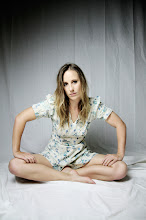
From our table for four we can see out over the ruins to Syria's Golan Heights, and, through the haze, can just make out The Sea of Galilee stretching into Israel on the distant horizon. The peace and tranquility that washes over us with the cool afternoon breeze belies the millennia of conflict these marble and basalt columns have seen.
We are seated in the al freso area of the Um Qais Resthouse, set high on the hill of Ottoman ruins. Down below, the ancient acropolis is alive with the movement of children picking flowers and kicking soccer balls, hijabed women watching closely, the younger ones joining in the games. In the scrub there are families having picnics, and groups of men passing the Narghile, it's fragrant smoke wafting across to the west theatre.
The food arrives promptly, the usual Arabic fare, hummus, eggplant salad, grilled meat and vegetables. We tuck in eagerly, having worked up a hunger during the two hour trip from Amman with all it's hair-raising near misses. Our driver, in typical Jordanian fashion, drives like a teenager in a drag race, overtaking from the left into oncoming traffic, slowing down and hooking his left arm through the seatbelt loop only when traffic police are in evidence.
When we can eat
 no more, we sit back and take in our surroundings. The group of six French tourists, with their Lonely Planet 'Jordanie' guide have gone, and we are now the only foreigners on site. Or at least the only Western ones. It is Friday, the day of religious rest for Muslims, and many of them have chosen to spend it here, in a place where they can gaze out over the occupied territories at what might have been their former homeland.
no more, we sit back and take in our surroundings. The group of six French tourists, with their Lonely Planet 'Jordanie' guide have gone, and we are now the only foreigners on site. Or at least the only Western ones. It is Friday, the day of religious rest for Muslims, and many of them have chosen to spend it here, in a place where they can gaze out over the occupied territories at what might have been their former homeland.After several hours wandering through the ruins we make our way back to the car park where our driver will be waiting. There is a steady flow of oncoming foot traffic into the site, and a hijabed woman mutters something that most of us don't catch, but which the Arabic Speaker translates roughly as, 'Bloody foreigners.' They are a much more conservative crowd than than the veiled women in their fashionable clothes we see on the streets of Amman. A little girl lagging behind her family looks up at us and says, 'Haram'. She is using the Arabic word for 'forbidden' and it is unclear whether she is looking at the large lensed camera being carried, or at the bits of skin that aren't covered by my scarf and jacket, however, to the strict followers of her religion, both camera and flesh fall into that category.
We leave the site, and the trinket stands behind us immediately pack up their wares. There will be no more tourists today. In the evening the locals will light fires and barbeque meat on this significant site without the annoyances of telephoto lenses and uncovered women.



No comments:
Post a Comment